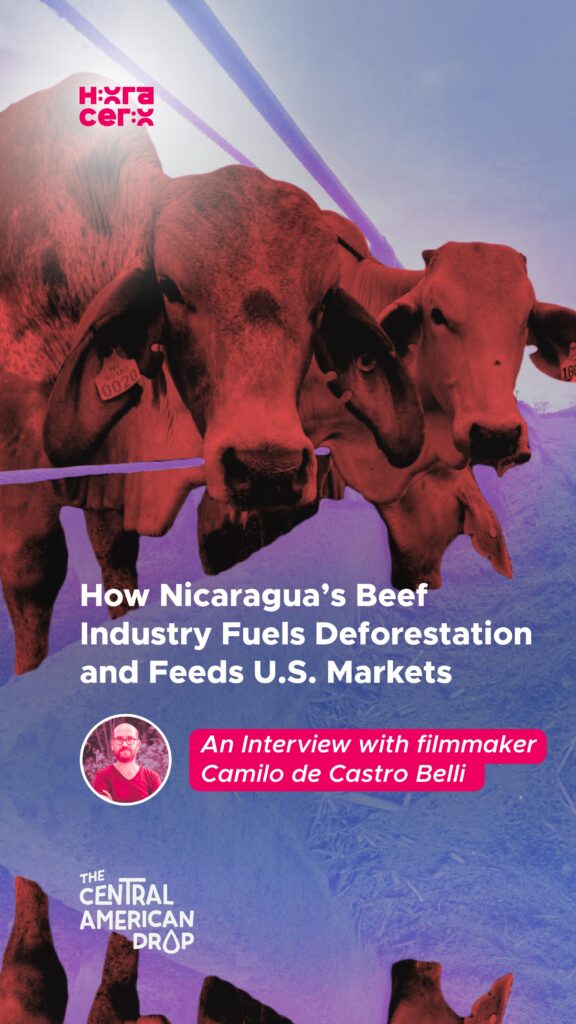
Camilo de Castro: Beef is Nicaragua’s second most important export commodity, and production has increased dramatically since the early 2000s, especially after CAFTA and relationships with Venezuela. To access the US market, Nicaragua received support from the Inter-American Development Bank to establish a national traceability system meant to reassure buyers and track sanitary issues. However, we found that this system is quite opaque and not really transparent. Despite claims from the industry, the agricultural frontier keeps advancing into the Atlantic Coast, which is home to indigenous and Afro-descendant communities, with high deforestation as a result. For example, Nicaragua lost about 10% of its primary forest in just two years, and over 30% since Ortega came to power. Most beef (92%) is exported, and we’ve documented tagged cattle in protected areas, showing the system is being exploited.
We focused on two territories—Bosawas and the area known as Indio Maíz—where the environmental impact of cattle ranching is most stark. We mapped the cattle infrastructure and found significant facilities and networks that help to “launder” cows from these protected areas to slaughterhouses. These cows often end up legalized and mixed in with others, making it hard to track their origin.
Large and small ranchers use different routes: smaller ranchers sell to buyers who later legalize and transport the cattle, while big ranchers use networks to move cattle into and out of protected areas. The slaughterhouses, pressured to meet US demand, have “programadores” who must buy quotas of cattle but rarely verify their origins. This lack of proper verification and reporting perpetuates the problem.
We also found major deficiencies in official controls. The regulatory agency IPSA doesn’t sufficiently verify cattle movements or farm registrations, and municipalities issuing transportation permits do so without checking the traceability database. Most checks are superficial, only triggered when cows are reported stolen. The priority seems to be keeping business running, not protecting the environment.
Camilo de Castro: Cattle ranching is not new in Nicaragua but has grown more prominent in recent decades. The industry connects deeply with Nicaragua’s financial sector—many slaughterhouses are owned by families linked to major financial groups—and foreign companies also play a role. There’s little incentive for them to address illegal activities, especially under a government that’s sidelined associations and stifled civil society, making transparency and accountability even harder.
Camilo de Castro: Our investigation, in partnership with the Environmental Investigation Agency in Washington DC, traced Nicaraguan beef to major buyers like Walmart, Burger King, Sam’s Club, Kroger, Aldi, Applebee’s, Chili’s, Cracker Barrel, Dairy Queen, Taco Bell, and more. US consumers should ask these companies for transparency and accountability—ask where the beef comes from at their supermarkets.
One legislative tool could be reinstating the country-of-origin label, which was removed during the Obama administration; currently, beef mixed with a quarter US origin can be labeled as “Made in the USA.” Supporting country-of-origin labeling and other laws, like the proposed FORCE Act, would force companies to perform due diligence and help consumers make informed choices.
The most impactful action is reducing beef consumption, which would lower your carbon footprint significantly, even if only one day a week. If you do consume beef, press companies and representatives for transparency and stronger regulations to avoid supporting environmental harm.
Camilo de Castro: There’s an open letter at the Rewild website for people to sign, and we encourage everyone to learn more, get involved and follow our work through patrolmovie.com and social media. We need greater public awareness and action on these issues.

| Cookie | Duración | Descripción |
|---|---|---|
| cookielawinfo-checkbox-analytics | 11 months | This cookie is set by GDPR Cookie Consent plugin. The cookie is used to store the user consent for the cookies in the category "Analytics". |
| cookielawinfo-checkbox-functional | 11 months | The cookie is set by GDPR cookie consent to record the user consent for the cookies in the category "Functional". |
| cookielawinfo-checkbox-necessary | 11 months | This cookie is set by GDPR Cookie Consent plugin. The cookies is used to store the user consent for the cookies in the category "Necessary". |
| cookielawinfo-checkbox-others | 11 months | This cookie is set by GDPR Cookie Consent plugin. The cookie is used to store the user consent for the cookies in the category "Other. |
| cookielawinfo-checkbox-performance | 11 months | This cookie is set by GDPR Cookie Consent plugin. The cookie is used to store the user consent for the cookies in the category "Performance". |
| viewed_cookie_policy | 11 months | The cookie is set by the GDPR Cookie Consent plugin and is used to store whether or not user has consented to the use of cookies. It does not store any personal data. |